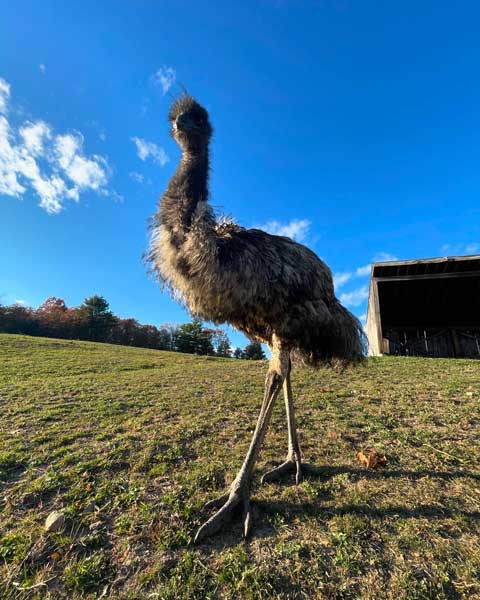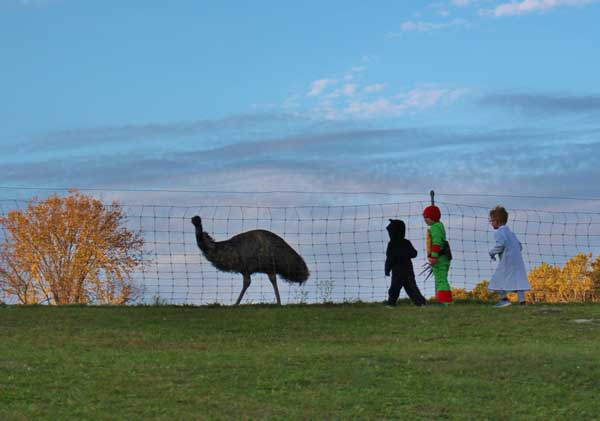Written by Katie Schelzel, Operations Manager
People slow down when they drive past Joppa Hill Educational Farm. Not for the view. Not for the scenery. For Dundee.
She’s six feet tall, covered in feathers, and pacing the fence line like she has somewhere very important to be. But she doesn’t. She’s an emu.
Dundee’s a local celebrity here in Bedford, New Hampshire. Cars slow down to admire her. Hikers stop to chat with her. Neighbors swap stories about her latest antics. She is, without question, one of the most recognizable and beloved animals on the farm.
So… What’s an Emu?
First things first: it’s pronounced EE-m-you or EE-mew. Regardless of how you say it, say it with confidence, that’s really what matters.

Emus (Dromaius novaehollandiae) are native to Australia. They’re the second-largest bird in the world, after the ostrich, and can grow up to six feet tall. They can also run up to 31 miles per hour, not that Dundee has any interest in proving that.
Emus Are Weird, Wonderful, and Worth Knowing About
- Emus can live 5 to 10 years in the wild, but in safe, cozy places like Joppa Hill Educational Farm, they can live up to 35 years. Dundee was born on June 1, 2014, which, yes, makes her a Gemini. If you know anything about Geminis, it checks out: curious, dramatic, highly social, occasionally unpredictable… sound like anyone you know?
- Dundee came to us in 2021 from a rescue where she was surrendered after being hand-raised and deeply loved. When her former owner had to move, we were lucky enough to give Dundee her forever home.
- Emus have brains roughly the size of a walnut, which explains a lot. Long-term memory? Not exactly their thing. Routine, though? That’s where they shine. Dundee can often be found pacing the same well-worn paths along her fence line, proudly serving as the farm’s security. No one’s told her it’s a pretty low-crime neighborhood, and honestly, we’re not about to.
- Emus don’t have taste buds, but this doesn’t bother Dundee one bit. She is still somewhat food-motivated and especially fond of purple grapes and mealworms.
- Emus have excellent eyesight, which is impressive, considering Dundee once managed to get 15 porcupine quills stuck in her eye and eyelid during the summer of 2024. Yes, fifteen. And yes, I personally removed every single one with a pair of pliers, because that’s just another Friday night when you run a farm. These days, Dundee mostly uses those sharp eyes to spot snacks, visitors, or anything shiny enough to investigate.
- Female emus, like Dundee, produce a low, deep drumming sound as part of their mating call. It can travel more than a mile in the wild. Here, it travels exactly as far as necessary to make sure no one forgets that Dundee is the main character.

- Emus are naturally curious and have a particular weakness for shiny things. Dundee has been known to peck at jewelry, piercings, zippers, car keys, camera lenses, and once, memorably, tried to remove a bolt from our John Deere Gator with the confidence of a certified mechanic.
- Emu feathers are pretty unusual — each one has two shafts instead of one, which helps with insulation and gives them that slightly disheveled, permanently windblown look. Nature said feral, and emus said thank you.
- Emus can kick hard enough to injure or kill predators, using their powerful legs and sharp toenails. Dundee has never needed to use this particular skill, but just between us… I would absolutely not bet against her in a street fight.
Why Are Emus Farmed?
Dundee lives the good life here, but emus are often farmed in other parts of the world for a variety of reasons, including:
- Emu oil, prized for its moisturizing and anti-inflammatory properties
- Lean red meat, which is high in protein and iron
- Leather, used in specialty products
- Feathers, used decoratively or in crafts
Frequently Asked Questions About Dundee
Does Dundee get cold in the winter?
Not really! Emus are built for a range of temperatures, and Dundee has a thick layer of soft, insulating feathers that keep her warm even on the coldest New Hampshire days. If she’s chilly, she’ll fluff up like a giant feather duster or sit down to cover her legs and feet.
Is she lonely? Shouldn’t she have a friend?
We get this question a lot, and it comes from a kind place! But here’s the thing about emus: they’re not automatically social, and they don’t always play nice.

Dundee is a solo emu by design. Introducing another emu to her space would likely end in disaster (and by disaster, I meanDundee would probably try to eliminate the competition). Right now, she’s perfectly content being the queen of her pasture, interacting with people, horses, and one super cute donkey… all on her terms.
Can she fly?
Nope, but she’d be a whole lot cooler if she could! Emus are flightless birds. What they can do is run at speeds up to 31 miles per hour and jump surprisingly high.
Does she lay eggs?
Dundee could lay eggs since she’s female, but emus only lay during breeding season if conditions are just right. Think: the right light cycle, the right temperatures, the right mood… and, of course, a suitable male nearby (which she absolutely does not have, nor want 💅).
Is she friendly? Can I pet her?
Dundee is friendly in the way that a very large, very opinionated bird can be, and honestly, she loves a good back scratch. Find the right spot, and she’ll sit right down like a giant, prehistoric dog and happily let visitors pet her through the fence. Why does she like it so much? Let’s just say… it’s instinctual. And if you know, you know.
What Not To Do Around Dundee (If You Value Your Jewelry… or Your Dignity)
- Don’t wear dangly earrings or shiny piercings within beak range. Consider this your warning.
- Don’t wave your car keys around like bait.
- Don’t assume she doesn’t notice your Fitbit, Apple Watch, or bedazzled phone case. She does.
- Don’t lean too close with a loose bolt, zipper, or metal water bottle. She has thoughts.
- And above all? Don’t assume Dundee won’t investigate you. She absolutely will.
Why We Love Dundee (And Why Everybody Else Does, Too)
Dundee isn’t just another animal on the farm. She’s a little bit of a legend.
She’s a farm greeter, a neighborhood icon, and a one-bird welcoming committee for anyone passing by. She reminds us to slow down, notice the small things, and maybe laugh a little more often at the strange, beautiful creatures who share the world with us.
So, the next time you’re walking the trails near Joppa Hill Educational Farm or driving down Joppa Hill Road, keep an eye out for Dundee. Give her a wave. She’ll probably stare right back at you with those big, curious eyes… just don’t wear sequins.
